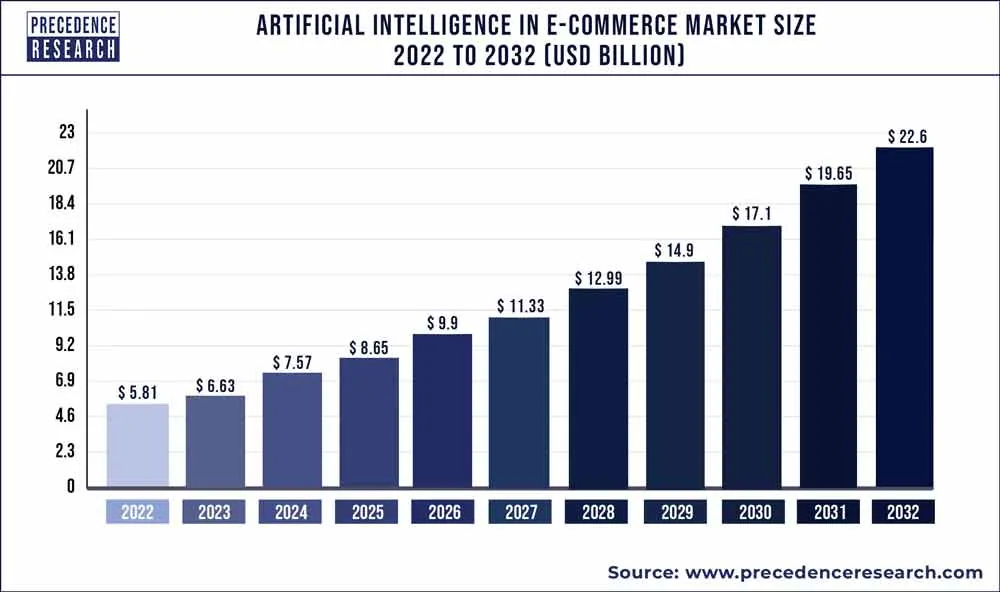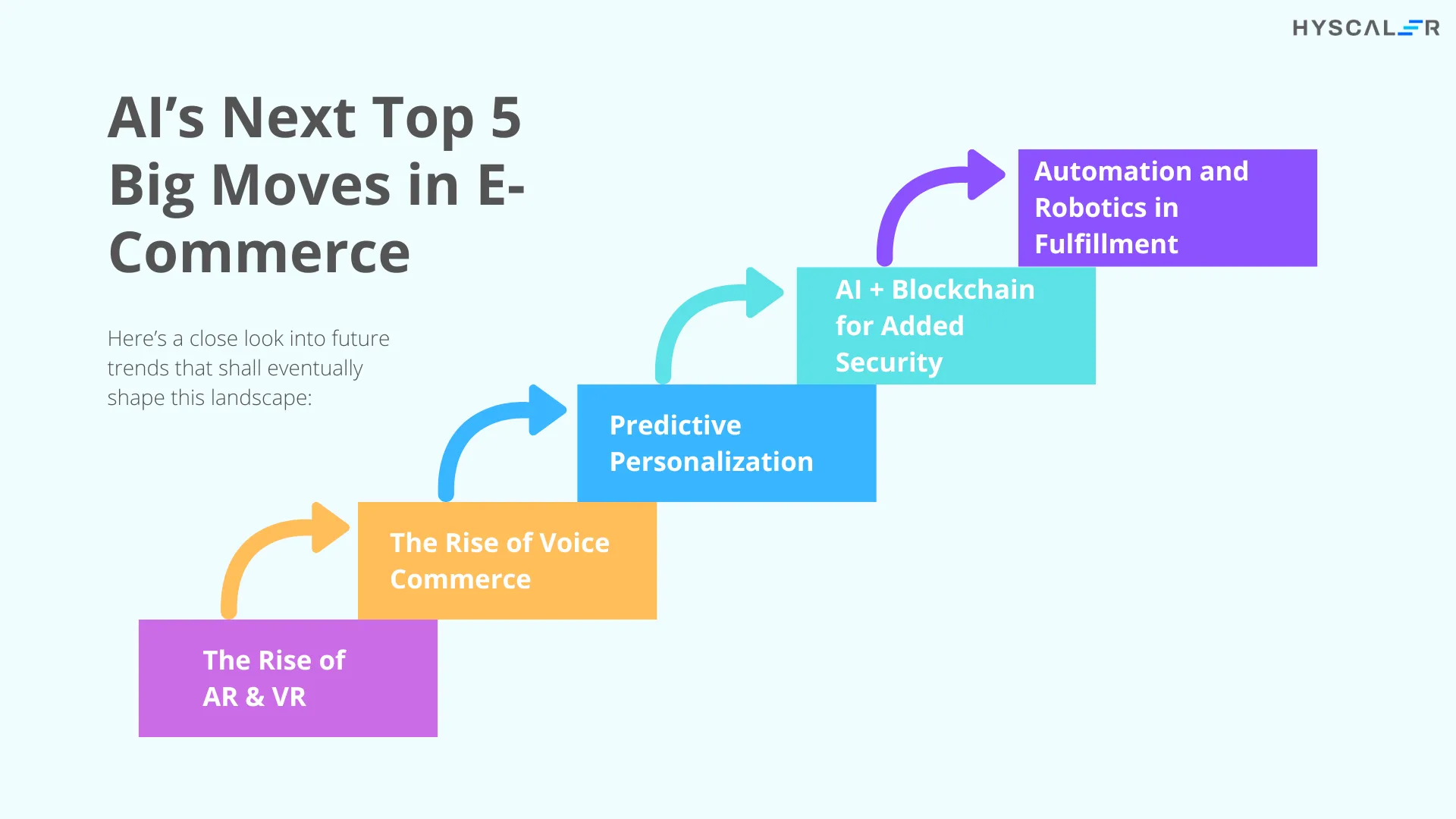Table of Contents
A new revolution in online shopping by AI-powered e-commerce is transforming the way consumers interact, manage logistics, and meet many other requirements. At one point, it was far-fetched. Today, however, AI plays a vital role in e-commerce approaches that are still pertinent for brands when fulfilling the constantly changing needs of tech-savvy shoppers. In this regard, organizations can personalize, stock, and streamline customer relations into more effective service delivery using artificial intelligence.
In fact, according to a report by McKinsey, AI could raise profitability to 60% in retail via automation and data-driven insights. Companies using AI-powered e-commerce to anticipate customer needs and tailor interaction can get ahead of the competition while more than 50% are adopting AI technology in some way. This digital transformation is more than just a trend-it is a necessity for staying relevant in this rapidly changing e-commerce space.
The Brainpower Behind the AI-Powered E-Commerce Boom: Key AI Technologies
Several AI technologies are playing a pivotal role in reshaping the AI-powered e-commerce landscape:
Machine Learning (ML): In AI-powered e-commerce, a machine learning algorithm sifts through much customer data so that a person can be experienced and recommend tailored products. According to a McKinsey 2023 report, 75 percent of e-commerce companies claim to have sales growth as a result of ML-product recommendation engines. It also forecasts customer preferences and behavior patterns, thus maximizing business marketing campaigns as well as decision-making processes.
Natural Language Processing (NLP): AI chatbots and virtual assistants are new touchpoints of customer interaction, able to provide businesses with 24/7 customer support and real-time answers to queries. The market for chatbots is expected to grow, according to Juniper Research, by $1.34 billion by 2024. This figure underscores the growing importance of conversational AI concerning customer service and interactions. NLP enables also search using voice, thus allowing a customer to search for a product using realistic terms. This AI-powered e-commerce boom makes for a more fluid shopping experience.
Computer Vision: Customers use it to search for goods in the online market. For example, with visual search, they can upload an image to find similar items. It eliminates the need for a customer to search via traditional means. By faster sorting processes, image recognition reduces human errors and makes warehouse management very efficient. According to a report from Deloitte, AI in supply chain operations can save retailers $340 billion annually through improved efficiency and reduced costs.
The AI Edge: Transforming Business and Consumer Experiences
AI-Powered Customer Support: AI-powered e-commerce chatbots help to provide 24-hour service to customers without long waiting times for efficient, yet quick solutions. These AI assistants can tackle common inquiries and resolve difficulties, as well as more complex demands, thus relieving the bulk of the workload from human agents while optimizing their operations. The chatbot market is projected to be surging dramatically as Juniper Research estimates, it will rise to 1.34 billion dollars by the year 2024. This increased dependence on AI chatbots is an indicator of a shift into more easily automated customer support.
Smarter Inventory & Supply Chain Management: By predicting demand for the product, e-commerce AI can optimize the inventory level of a company while reducing waste. Thanks to AI, businesses can forecast trends, customer demand spikes, and stock movements, which can avoid overstocking or stockouts. An article published by McKinsey in 2021 states that AI-harnessed supplies can save businesses almost $340 billion per year, thus underscoring a strong potential for cost savings through AI in operations.
AI-Powered Fraud Detection: In real-time, these AI-powered e-commerce technologies analyze huge amounts of transaction data to find suspicious patterns and combat fraud. AI algorithms will pick up even very slight indicators of fraud when used with continuous learning from the new data provided. In this light, preventing and tackling security threats will be easier for the businesses concerned. AI is in more demand in fraud detection. Increasingly, AI-powered security systems are being used in industries to save financial losses and to protect customer information.
Dynamic Pricing: AI-enabled e-commerce platforms dynamically adjust prices during transactions depending on demand, competitor prices, and market conditions, making pricing decisions possible. In so doing, they keep up business competition while maximizing profit margins. Particularly an article by PwC in 2022, discovered dynamic pricing practice could yield up to a 25% increase in revenues from e-commerce business is another important aspect of AI-powered e-commerce applications related to pricing strategies.
Leading the Pack: Real-World AI Success Stories in E-Commerce
E-commerce leaders are adopting AI technologies for business success, promoting customer satisfaction, and improving processes. Here are some that successfully use AI in very different and successful ways:
Amazon: It is viewed as one best examples regarding how AI can be used to improve the experience of the customer’s future value and operation efficiency. Its AI-based recommendation engine requires analysis of huge volumes of consumer data for highly personalized product suggestions. Dynamic pricing employed by Amazon is the second characteristic that applies to AI. It uses AI interpretation as a variable price change for products based on the level of demand and market situation associated with them and thus makes its pricing competitive in a timely marketplace.
Alibaba: Chinese e-commerce giant Alibaba spearheads innovations in e-commerce by embracing artificial intelligence for visual searches and customer service chatbots. For instance, its AI-based chatbot termed AliMe is capable of handling millions of customer queries in a day, amassing over 90% resolution rate on issues that customers face. Additionally, products are recommended based on personal data through AI.
Sephora: Sephora has adopted augmented reality and supported artificial intelligence to experience new shopping. Virtually trying on makeup improves decision-making and lessens the margin of returns. Personalized recommendations of products based on history browsing and purchase are further enhanced in customer service by AI.
Stitch Fix: Stitch Fix uses a combination of artificial intelligence and human expertise to offer personalized fashion recommendations. By analyzing customer data such as size, style preferences, and previous feedback, AI will help Stitch Fix curate the perfect selections for each customer.
Metrics That Matter: AI’s Impact on E-Commerce Performance
Revenue Growth from AI-Driven Personalization: A 2022 Accenture report claims that an AI-powered personalized shopping experience can increase e-commerce sales by up to 30% or more. Companies are using AI for hyperpersonalization in recommendations based on customer behavioral insights, which converts sales at a much better rate.
Customer Satisfaction Boost: According to a PwC 2023 study, 85% of consumers say they are expecting personalized experiences with the brands they interact with online. AI for tailoring content and products according to individual preferences has increased consumer satisfaction and loyalty.
Operational Efficiency Gains: As reported by McKinsey in 2023, the e-commerce companies that made use of AI in inventory and supply chain management were able to save around 20% of their operational costs. Demand forecasting and optimization in stock would help businesses minimize waste and maximize efficiency.
Fraud Prevention Improvements: The AI analyzes all kinds of raw data and can make better analyses for fraud detection. As per the Juniper Research 2023 study, fraud provides AI with an enhanced prevention system that helps e-commerce firms avoid fraud up to thirty percent and gives better security and environment for transactions to clients.

Glimpsing the Future: AI’s Next Big Moves in E-Commerce
Artificial Intelligence is going to lead transformation in e-commerce, probably bringing radical changes to the shopping habits of consumers and lifestyles of businesses. Here is a more interesting and close look into future trends that shall eventually shape this landscape:
The Rise of AR & VR: The union of Augmented Reality (AR) and Virtual Reality (VR) with AI will lead to dynamic and real-time experiences while shopping. The customer will virtually drape clothes, try various make-up products, or try out viewing an item appearing in his home, and all this would happen before buying it. The other thing to look forward to is personalized product recommendations based on preferences and previous behavior given by AI-powered AR/VR systems. This is a bridge between online and offline shopping channels, much in the way of engagement and higher sales conversion.
The Rise of Voice Commerce: With increasing numbers of consumers shopping with ever-present voice assistants such as Amazon Alexa and Google Assistant, the industry anticipates that voice-enabled commerce will explode as an AI-enabled segment. Buyers will retrieve, query, and transact voice commands all through buying via an improved search of things using the voice. Voice commerce will possibly be as mainstream as mobile shopping in the future technologically, delivering the most appropriate convenience for busy customers.
Predictive Personalization: The future of AI-powered e-commerce will be around predictive personalization. The AI then scans the relevant data of the customer from huge amounts of browsing or even purchase history for further shopping behavior forecasts. This means that it is possible to pre-define the products and services as desired rather than when the customer knows he wants them. This anticipatory approach will help craft a wholly personalized shopping experience that improves customer satisfaction toward greater loyalty.
AI + Blockchain for Added Security: If applied together, AI and blockchain will redefine the security and transparency level in any transactions of e-commerce. AI with certain algorithms is supposed to be capable of tracking and verifying transactions from blockchains in real-time so that all transactions would be seen or deemed legal and security guaranteed. Coupled with the fraud detection capability of AI, locality causes the risk of purchasing through the online medium to minimize for both businesses and consumers alike, creating a safer world of trust in the digital market.
Automation and Robotics in Fulfillment: Shortly, many tasks that humans now do in fulfillment centers will be handled by robots, thanks to AI. These robots will help sort products and pack orders, among other tasks, increasing the efficiency and speed of the entire order fulfillment process. Indeed, some of these autonomous robots are now at work in warehouses to minimize human fallibility and enhance operational efficiency. Also, AI might redefine delivery services; last-mile deliveries might end up being handled by self-driven vehicles and drones which in turn will save time and costs associated with such logistics.

Wrapping Up: The Future of AI-Powered E-Commerce
Artificial intelligence is no longer an add-on or feature. It has come to be a game-changer for the e-commerce industry. From personalized shopping experiences to more efficient logistics and beyond, it is enabling businesses to meet ever-changing consumer demand and prepare themselves for newer and greater levels of operational efficiency. Those adopting today will be leading the charge into the future of retail.
Want to be at the top? Now is the best time to explore how artificial intelligence could shape your e-commerce strategy away from the rest. Don’t be left behind-the future is at your doorstep!





